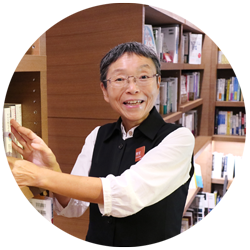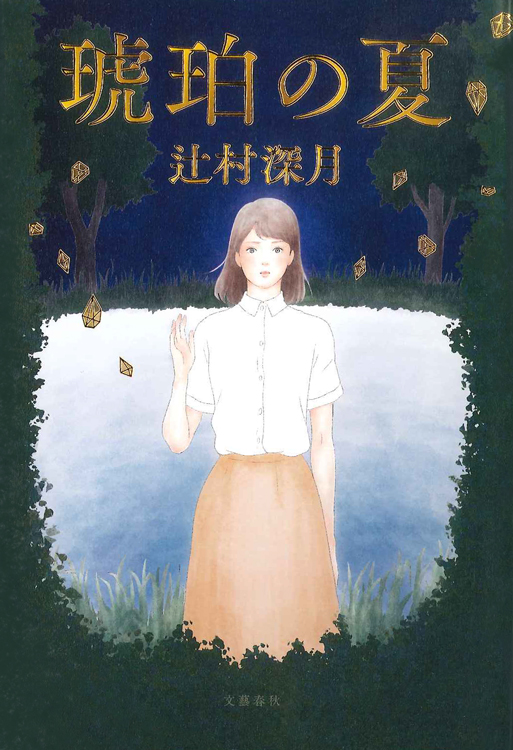[154th] Michiko Mamuro's Bookshelf "Amber Summer" by Mizuki Tsujimura / Bungeishunju
Known as the "original charismatic bookseller," DAIKANYAMA TSUTAYA BOOKS, who recommends books in a variety of media including magazines and TV.
In this series, we take a peek into the "bookshelves" in the mind of our most popular concierge.
Please enjoy it along with his comments.
* * * * * * * *
"Amber Summer"
Mizuki Tsujimura / Bungeishunju
Click on the image to go to the purchase page.
Click on the image to go to the purchase page.
* * * * * * * *
The members of Mirai no School live in the midst of nature. This organization strongly values the independence of children, so parents and children do not live together. Children live with their "teachers" at the school, while the parents go to another branch. Even if they are in the same place, they cannot meet because they live in different areas. Some people live in the general society and leave their daughters or sons in the care of others.
There was a video clip inviting children from outside to participate in the summer camp. After some comments from local parents such as "When they come back, their eyes shine in a different way," and "Even though my child was not good at expressing his feelings, he just couldn't stop talking," the video showed a scene of a "question and answer session," which is the group's biggest selling point. They get the children to discuss war, peace, love, and friendship. Then, in the middle of the video, there was a beautiful fountain, a symbol of the group...
Thirty years later, the skeletal remains of a young girl were found at the site of the headquarters in Shizuoka, causing a public uproar. Then, an elderly couple came to lawyer Noriko Kondo, claiming that the girl was their granddaughter. They asked her to act as a go-between for the secretariat, which had been unresponsive to their inquiries.
While the group was heavily criticized as a religion or a cult, Noriko had a strong feeling that it was a fun place. She had been invited by a classmate whose parent was a member, and had participated in the camp for three consecutive years since the fourth grade of elementary school.
Unlike my usual school days where I was not doing well, for a week in the summer I was able to be myself. And I made friends with Mika-chan, a girl my age who was living at the "school" away from her mom and dad.
But I'd forgotten all about it until the body was found.
The grandson of the elderly couple would be 40 years old if he were alive. Just like Noriko. Did I meet the dead child that summer? The thought crosses my mind...
A wide variety of people appear in the story, including a woman named Tanaka who works in charge of public relations for the hostile school, a former "teacher" who wrote an exposé book, the adult children, and Noriko's mother. It becomes clear that everyone involved with the Mirai School is trapped there in some way.
If it's malice, we can rebel or argue. But when the words or actions directed at us are coated with love, we suppress our doubts and feelings of dislike. When that love is peeled away, what is deep inside? Are the insects in the amber protected, or trapped? I thought about this as I turned the pages.
The highlight of the story is the scene where Noriko thinks she has "stood on the same side as the other person." When she was a child, at a spring at night. In the midst of the debate over whether to take on the defense of a certain person in the skeleton case.
What made the biggest impression on me was her relationship with her husband, Eiji, who is also a lawyer. When it comes to raising their three-year-old daughter and finding a nursery school, Noriko uses the word "my husband is supportive." In other words, she is the main focus. Also, it may have just been "a coincidence that day!" but Eiji doesn't clear his lunch plate after he's finished eating. Female readers will not miss this. Furthermore, he once told Noriko, with a shy smile, a word that couples should not say.
But in the scene after the "milk carton incident" when she comes home and talks to her husband, I thought as I read this that perhaps at the root of his inappropriate remarks was not the man's ego, but his feeling that babies are just adorable. When she peeled away what seemed like love, what emerged was his own insensitive love. And it was at this point that Noriko realized the harshness of the job of a lawyer, and the feelings of a parent wanting to bless their daughter - that her husband and she were on the same side.
It's wonderful to see the field of vision suddenly open up before Noriko and before the reader.
There was a video clip inviting children from outside to participate in the summer camp. After some comments from local parents such as "When they come back, their eyes shine in a different way," and "Even though my child was not good at expressing his feelings, he just couldn't stop talking," the video showed a scene of a "question and answer session," which is the group's biggest selling point. They get the children to discuss war, peace, love, and friendship. Then, in the middle of the video, there was a beautiful fountain, a symbol of the group...
Thirty years later, the skeletal remains of a young girl were found at the site of the headquarters in Shizuoka, causing a public uproar. Then, an elderly couple came to lawyer Noriko Kondo, claiming that the girl was their granddaughter. They asked her to act as a go-between for the secretariat, which had been unresponsive to their inquiries.
While the group was heavily criticized as a religion or a cult, Noriko had a strong feeling that it was a fun place. She had been invited by a classmate whose parent was a member, and had participated in the camp for three consecutive years since the fourth grade of elementary school.
Unlike my usual school days where I was not doing well, for a week in the summer I was able to be myself. And I made friends with Mika-chan, a girl my age who was living at the "school" away from her mom and dad.
But I'd forgotten all about it until the body was found.
The grandson of the elderly couple would be 40 years old if he were alive. Just like Noriko. Did I meet the dead child that summer? The thought crosses my mind...
A wide variety of people appear in the story, including a woman named Tanaka who works in charge of public relations for the hostile school, a former "teacher" who wrote an exposé book, the adult children, and Noriko's mother. It becomes clear that everyone involved with the Mirai School is trapped there in some way.
If it's malice, we can rebel or argue. But when the words or actions directed at us are coated with love, we suppress our doubts and feelings of dislike. When that love is peeled away, what is deep inside? Are the insects in the amber protected, or trapped? I thought about this as I turned the pages.
The highlight of the story is the scene where Noriko thinks she has "stood on the same side as the other person." When she was a child, at a spring at night. In the midst of the debate over whether to take on the defense of a certain person in the skeleton case.
What made the biggest impression on me was her relationship with her husband, Eiji, who is also a lawyer. When it comes to raising their three-year-old daughter and finding a nursery school, Noriko uses the word "my husband is supportive." In other words, she is the main focus. Also, it may have just been "a coincidence that day!" but Eiji doesn't clear his lunch plate after he's finished eating. Female readers will not miss this. Furthermore, he once told Noriko, with a shy smile, a word that couples should not say.
But in the scene after the "milk carton incident" when she comes home and talks to her husband, I thought as I read this that perhaps at the root of his inappropriate remarks was not the man's ego, but his feeling that babies are just adorable. When she peeled away what seemed like love, what emerged was his own insensitive love. And it was at this point that Noriko realized the harshness of the job of a lawyer, and the feelings of a parent wanting to bless their daughter - that her husband and she were on the same side.
It's wonderful to see the field of vision suddenly open up before Noriko and before the reader.

DAIKANYAMA TSUTAYA BOOKS Literature Concierge
Michiko Mamuro
【profile】
She is the "original charismatic bookseller" who recommends books in various media such as magazines and TV. She has a serial in the magazine "Fujingaho", the online magazine "Tabiiro TABIIRO", and Asahi Shimbun Digital's "Honya no Hon". She is also active as a book critic, and her paperback commentaries include "Tiny Stories" (Yamada Eimi/Bunshun Bunko), "Motherhood" (Minato Kanae/Shincho Bunko), "Meandering Moon" (Sakuragi Shino/Futaba Bunko), and "Staph" (Michio Shusuke/Bunshun Bunko).

























